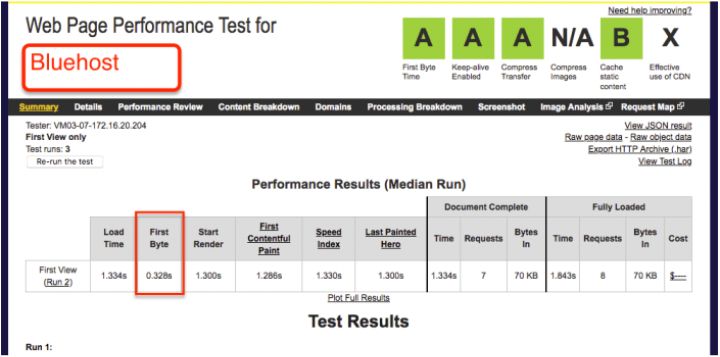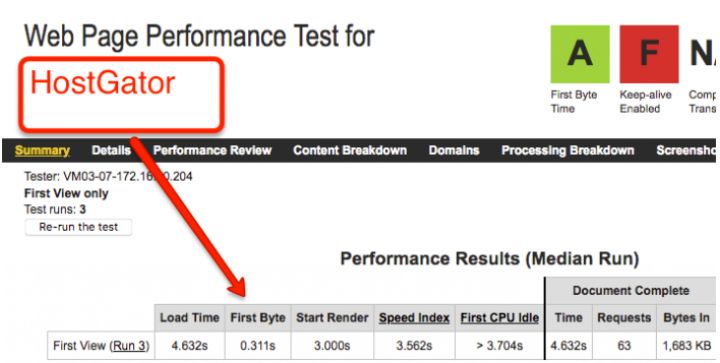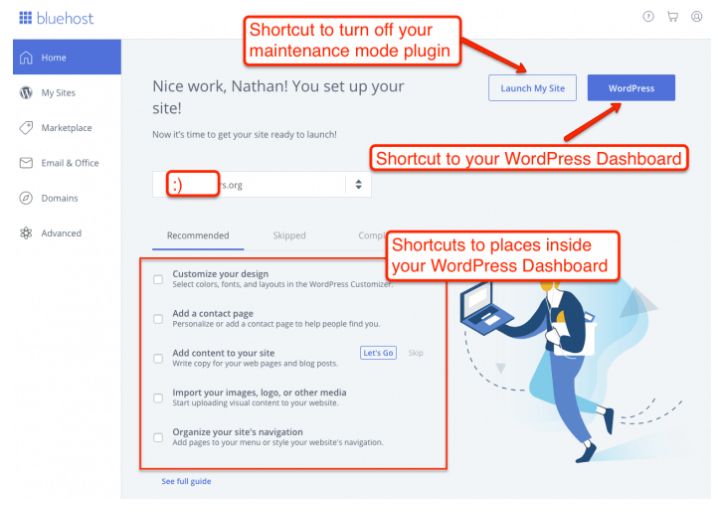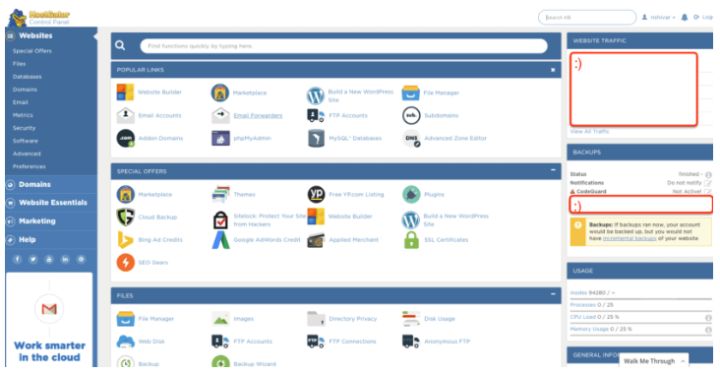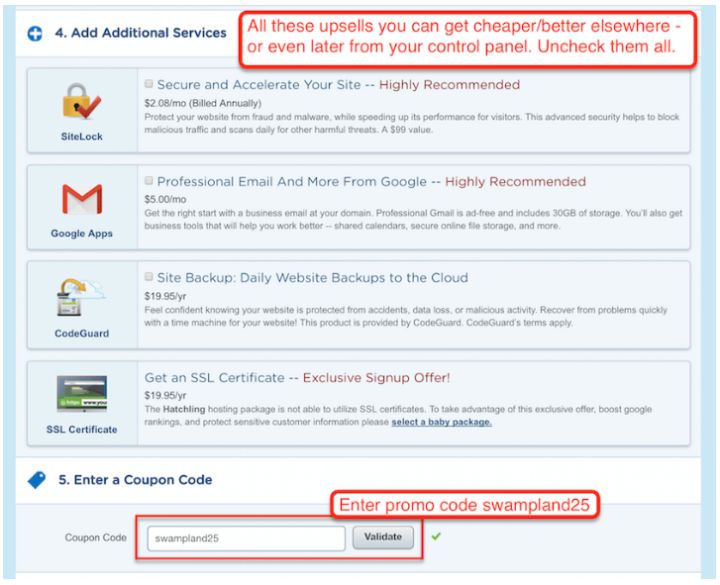Comparing Bluehost and HostGator is like trying to decide between Coke and Pepsi. Not much sets the two apart, but you’re still deciding on a product you’ll likely use for several years. I’ve previously written individual reviews, but this post compares Bluehost and HostGator head-to-head.
I’ll share differences I’ve found in seven key areas ranging from pricing structure to customer service and market focus so that you can decide which is the best fit for your website.
Let’s start with the similarities. Bluehost and HostGator are both:
- Owned by the same company, Newfold Digital, a large technology corporation
- Established, well-known brands in the hosting industry
- Provide a similar menu of products that revolve around shared Linux hosting
- Use cPanel to provision new accounts
- Provide pricing & hosting products that focus on small to midsize companies
Despite the many similarities, they are different companies with different brands.
Comparison Summary
| My Review | Bluehost Review | HostGator Review |
|---|---|---|
| My Rating | 9.5/10 | 9/10 |
| Promotion | Starting At $2.95/mo | Get 65% Off |
| Cheapest Plan | $2.95/mo. | $2.75/mo. | Uptime Guarantee |
| Money Guarantee | 30 days | 30 days |
| Free Domain | ||
| Free SSL | ||
| Free Website Migration | ||
| Learn More | Learn More |
I have current clients who use (and like) Bluehost. Bluehost has excellent business-focused features & support. They have a known & trusted brand.
I also have several projects that have run on HostGator for years. They have great value pricing and provide some great DIY features. I’ve been happy with them.
Bluehost vs. HostGator Pricing
Bluehost and HostGator offer a wide menu of web hosting products such as domain names, VPS hosting, WordPress hosting, and more.
But for pricing – we’ll focus on the most common product that small businesses usually need – shared Linux hosting.
Shared Linux hosting lets you run WordPress, Joomla, and most non-Windows web apps.
Bluehost Shared Hosting Plans
| Plan | Basic | Plus | Choice Plus | Pro |
|---|---|---|---|---|
| Initial Price* | $2.95/mo. | $5.45/mo. | $5.45/mo. | $13.95/mo. |
| Renewal Price | $10.99/mo. | $14.99/mo. | $19.99/mo. | $28.99/mo. |
| Websites | 1 | unlimited | unlimited | unlimited |
| Storage | 10 GB | 20 GB | 40 GB | 100 GB |
| Bandwidth/month | unmetered | unmetered | unmetered | unmetered |
| Free Domain Name | 1 year | 1 year | 1 year | 1 year |
| Free SSL | ||||
| CDN | ||||
| Dedicated IP | ||||
| Daily Backups |
HostGator Shared Hosting Plans
| Plan | Hatchling | Baby | Business |
|---|---|---|---|
| Initial Price* | $2.75/mo. | $3.50/mo. | $5.25/mo. |
| Renewal Price | $11.95/mo. | $12.95/mo. | $17.95/mo. |
| Websites | 1 | unlimited | unlimited |
| Storage | unlimited | unlimited | unlimited |
| Bandwidth/month | unmetered | unmetered | unmetered |
| Free Domain Name | 1 year | 1 year | 1 year |
| Free SSL | |||
| CDN | |||
| Dedicated IP | |||
| Daily Backups |
Bluehost and HostGator have a very similar pricing structure which includes tiered service plans (HostGator has three plans, and Bluehost has four.)
The first tier is for small websites on a budget. Bluehost calls it their Basic plan and renews at $10.99/mo. HostGator calls it their Hatchling plan and renews at $11.95/mo.
The two plans differ based on the type of cap they use.
HostGator uses a domain name cap. You can only have one website on the Hatchling plan, but that website is otherwise unmetered. It can handle large videos, has unlimited storage and databases (i.e., software installs on the same domain), and unlimited email accounts.
Bluehost caps the domain, website space, and email accounts. Like HostGator, you can connect a single website, but Bluehost limits storage and the number of email accounts you can set up.
For this reason, HostGator offers better value at this level.
The mid-range plans are the most comparable. HostGator calls it their Baby plan. It renews at $12.95/mo. Bluehost calls it their Plus plan. It renews at $14.99/mo.
Both are almost identical when it comes to core hosting features (I’ll cover this in more detail later). HostGator’s pricing is slightly cheaper.
The top tiers are less comparable since both are unlimited plans (outside of the physical limits of the server).
Instead, they compete based on bonus features. Bluehost calls it their Choice Plus plan, which renews at $19.99/mo. HostGator calls it their Business plan and renews at $17.95/mo.
Bluehost’s bonuses include Domain Privacy and free automated backups for one year. HostGator does free weekly backups with a paid $20 restore.
HostGator provides a free upgrade to positive SSL and a free toll-free phone number for your business. You also get a free dedicated IP and free SEO Tools. Unless you plan on using the backup restore a lot (i.e., you should be doing your own backups), HostGator is a better top-tier value – but only slightly.
If you are running a single site and want unlimited features, you’ll get the best value with HostGator’s Baby or Hatchling Plan.
Otherwise, their pricing is comparable enough that I’d look at the other differences between HostGator and Bluehost before deciding.
Hosting Features
As I’ve explained in my best web hosting reviews post, it’s useful to compare web hosting features by separating them into two groups – a “core feature set” and a “bonus feature set.”
Core features include the “3 D’s” – domains, disk space, and databases/email.
Domains refer to the number of distinct web properties you can connect to your hosting account. Disk space is how many files you can store on your account, and databases/email is how much software you can install to help manage those files (e.g., one install of WordPress requires one database on your server).
As mentioned, Bluehost and HostGator provide the same core features. They even allocate the same amount of default memory to their accounts.
They use industry-standard software such as cPanel and MySQL to “run” your core features. These allow for flexible and familiar management. There’s nothing proprietary about their setups (unlike other hosts like GoDaddy) – so you can pick up and leave whenever you want.
That said, you will notice a difference between Bluehost and HostGator on “bonus hosting features.”
HostGator offers bonus features such as marketing credits for Google Ads, Microsoft Advertising, etc. They offer free positive SSL upgrades, dedicated IP, and a free business toll-free phone number for your business.
Bluehost bonus features include additional marketing credits and free consultant time with a rep who will help set things up for you. Their onboarding is more focused on beginners than HostGator.
If you don’t care about the advanced features, then I recommend Bluehost. If you want access to more advanced features, then HostGator will be a better fit.
Performance
The core job of a web host goes beyond simply storing and delivering files to your website visitors. You need your web host to deliver the files quickly.
Many factors go into website speed, and you can’t always blame a slow website on a slow host (e.g., a Porsche 911 Turbo can’t do zero to 60 mph in 3 seconds if it’s towing a massive boat).
That said – server speed remains critical. There’s no good way for non-network engineers to measure server speed between hosts (too many factors).
For my web hosting reviews, I always use Time To First Byte (TTFB) – a measurement for how quickly a server sends back the first byte of data after it receives a request from a browser.
Here are the results from my most recent test:
As you can see, HostGator edges out Bluehost – which is odd since they share a data center on some accounts. Based on this finding, I’d say that HostGator shows slightly better performance than Bluehost.
Usability & Onboarding
Any good product can turn bad quickly if you can’t figure out how to use it. This is especially true with web hosts.
Thankfully, HostGator and Bluehost offer a straightforward onboarding process and good usability. They both use cPanel. They both maintain similar account portals and send out similar onboarding emails.
And they both make it easy to install common web apps like WordPress. Here’s what their respective “backend” setups look like:
As you can see, they are very similar. They both have clean designs. That said, Bluehost goes for a less cluttered look with fewer blatant upsells.
Their account management panel is a mid-2000s design and more minimalist. Their WordPress installation wizard includes fewer upsells for themes and services upsells. Here’s an example from HostGator’s signup process:
If you know what you want, neither is an issue, and Bluehost certainly does do upsells elsewhere.
Overall, Bluehost has an edge on usability and onboarding. It’s nothing decisive but does speak to the type of customer that they are looking for, which we’ll cover shortly.
Customer Service
Usability and onboarding can solve a lot of problems. but not every single issue. That’s where customer service comes in.
The tricky thing about customer service is that it’s all anecdotal. No single comparison (including this one) can state definitively if one company has “good” service or “bad” service.
You never know if your customer service agent just started yesterday, was their top performer, or was having a terrible (or awesome) day – or if it’s a deeper indication of company culture.
I look for signs that indicate whether a company treats its customer service as a cost, a sales opportunity, or an investment.
I know that the parent company, Newfold Digital, values the Net Promoter Score (NPS), a metric that measures how likely your customers are to recommend you.
That tells me that both HostGator and Bluehost view customer service as an investment leading to more sales and upsell opportunities.
That’s generally a good thing for you as the customer, with one caveat – upsells! If you don’t mind the annoying upsells, you’ll likely experience fine customer service from Bluehost and HostGator.
The main difference in how the two web hosts handle customer service lies in the technical support area.
In my experience and from Newfold’s investor reports, HostGator has more front-end technical expertise. In other words, the person you start talking to at HostGator is more likely to be able to solve your issue than at Bluehost.
At Bluehost – you’re more likely to be referred to a “technical specialist” or new upsell product.
*If good customer service is your top priority – be sure to also check out InMotion Hosting. They’re an independent company (not a subsidiary of a much larger organization) with a strong focus on customer service.
Market Focus
Newfold owns both Bluehost and HostGator. They actively invest in both (unlike other brands like JustHost, iPage, or HostMonster).
Why? My best guess is that they see them as complementary brands that fit different types of customers – sort of like Coke & Pepsi.
In my experience, Bluehost markets to people who are business owners first and website owners second. HostGator markets to people who are website owners first and business owners second.
It makes sense – and is a likely indicator of what products & improvements each brand will make in the future.
HostGator will likely continue to invest in technical improvements and pricing, whereas Bluehost may keep investing in usability and business products.
Other Factors
Here are some other factors to consider.
- HostGator has a longer money-back guarantee (45 days) than Bluehost (30 days).
- For better or for worse, they are both owned by a giant corporation. If you don’t want that, consider other options, like InMotion (review), Web Hosting Hub (review), or SiteGround (review).
- Bluehost is an official host for the WordPress Foundation, although both can run WordPress just fine.
- HostGator also offers Windows Hosting if that’s your thing.
FAQs
Bluehost vs. HostGator Conclusion
So Bluehost or HostGator? They’re both fine hosts with some differences. If you are more technically inclined or want better performance – then I’d go with HostGator.
If you value smooth onboarding and a seamless user experience, then I’d go with Bluehost.
And if you are more confused than ever – you might find my Website Setup guide or my best web hosting guide helpful.

